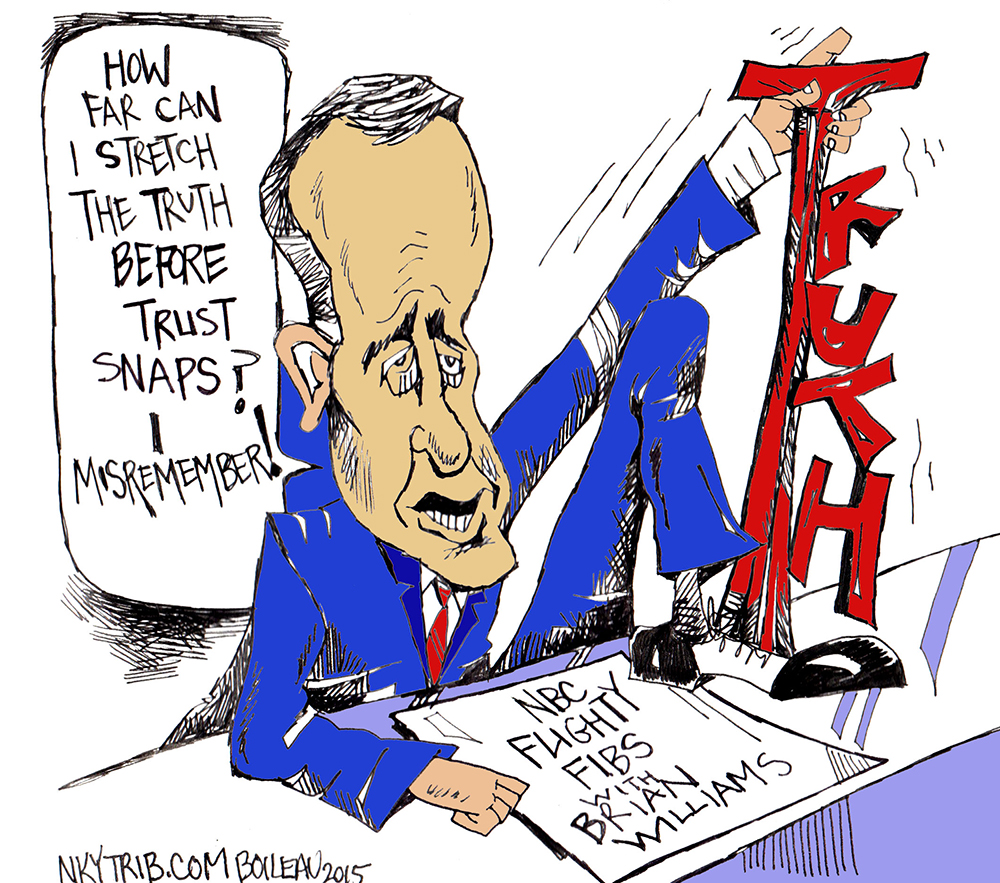
Public life has more than its fair share of people who exaggerate, “misremember,” deny and distort the truth. Some of them flat out lie.
But while celebrities, public officials and politicians – presidents even – generally recover after a short, painful firestorm and predictable public mea culpas, the trust broken by Brian Williams has far greater consequences.
The truth is Brian Williams, who has anchored NBC Nightly News for a decade, misled the public. Not once, mind you, but several times. The helicopter he rode on in Iraq was never hit by a rocket-propelled grenade.
Williams has said he misremembered. Most people, I suspect, would say he lied. Journalists know it as fabrication: He made it up.
Fabrication is what cost Janet Cooke her job at the Washington Post and the Pulitzer Prize thirty-plus years ago. She “invented” an eight-year-old heroin addict in her story “Jimmy’s World.”
It also cost Jayson Blair his job at the New York Times. He pretended he had been in Maryland and Texas when he was in New York, making up comments and concocting emotional scenes he never witnessed. His unethical journalism also cost two editors their jobs.
Sad to say, Cooke and Blair and Williams are not alone in the land of journalism sinners.
The National Summit to Fight Plagiarism & Fabrication was called to address what one critic called journalism’s “Summer of Sin,” a “cavalcade of plagiarism, fabrication and unethical recycling,” referring to the summer of 2012.
A group of 23 individuals representing 10 journalism organizations, worked for six months to provide “clear guidelines for plagiarism and fabrication and a consistent process for investigating and communicating about these incidents.”
At the summit to fight plagiarism, the group released an e-book, “Telling The Truth and Nothing But,” which defined fabrication as “making up material and publishing it in the guise of truth.” Plagiarism is considered the great plague of journalism, its unpardonable sin, but fabrication is worse. A journalist who plagiarizes steals the work of the reporter who produced it. The plagiarizer believes the material is true.
The fabricator, however, is deceiving the public with a lie he made up.
Trust and credibility
What makes fabrication so insidious is journalists are protected under the First Amendment so they can serve as watchdogs on behalf of the public, holding public officials and governments accountable by informing citizens of what is happening in the halls of power.
Brian Williams knows all of that. He was not a rookie behind the anchor desk. Why he chose to exaggerate or even totally misrepresent what happened while he flew on a U.S. helicopter in Iraq is a mystery.
I admire Williams for having the courage to report from a war zone. I don’t even want to get in a helicopter flying in Kentucky. Far be it from me to jump on one in Iraq or Afghanistan in the middle of a war.
As someone who teaches journalism history, I know war correspondents are as vulnerable as any soldier, sailor or aviator. One of American’s greatest and most beloved war correspondents, Ernie Pyle, died from Japanese machine-gun fire on an island in the Pacific Theater only months before the end of World War II. Pyle had followed American troops around the world, recording their heroics and their deaths.
James Foley and Steven Sotloff were covering the war in Syria when they were abducted and subsequently murdered by ISIS, two of the 61 journalists killed around the world in 2014, according to the Committee to Protect Journalists.
It’s hard to imagine the courage it takes to cover a war today in the Middle East, or the courage Williams displayed flying across a war zone.
But the most essential characteristic of a journalist is credibility. If the readers or viewers lose confidence in the integrity of a reporter’s ability to deliver factual information, if they no longer trust the anchorman, then he will need a different profession.
I know of no substitute for that trust. And now that the facts are clearer, now that we know the helicopter Brian Williams was riding in was not hit by grenade fire and that he didn’t look down the barrel of grenade launcher, we have to wonder why he lied and what else he lied about.
How – and if – he can recover his credibility, the trust of the 10 million people who watched him nightly, is a question he and NBC News will have to sort out during the six months Williams is grounded.
Fabrication, especially long-term fabrication, cannot simply be erased by an apology, no matter how sincere.
Mike Farrell is an associate professor in the School of Journalism and Telecommunications and director of the Scripps Howard First Amendment Center at the University of Kentucky. He was a journalist for nearly 20 years at The Kentucky Post and is a co-founder and special projects editor of the Northern Kentucky Tribune. His views are his own and not those of the university. He was a member of the working group that produced “The Truth and Nothing But” for the National Summit to Fight Plagiarism & Fabrication. He represented the Society of Professional Journalists.



















Excellent article, written by an excellent author with a strong moral compass. If only the world were filled with people of such quality and integrity!